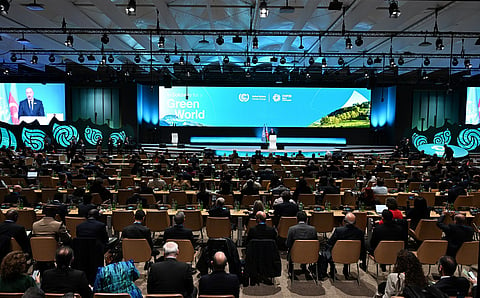

Climate change is combining with conflicts to put millions in utter distress, pointed out a UN report released on November 12 in Baku, on the sidelines of the 29th Conference of Parties (COP29) to the United Nations Framework Convention on Climate Change.
The report, released by UN Refugee Agency UNHCR in collaboration with 13 expert organisations, research institutions and refugee-led groups, uses the latest data to show how climate shocks are interacting with conflict, pushing those who are already in danger into even more dire situations.
Climate change is turning out to be an additional, and growing, threat to those already suffering from war, violence, and persecution, it adds.
The new report warns that the situation is getting grave without the funding and support for the exposed population to adapt to the climate risk.
Recently in Baku, the head of World Meteorological Organization (WMO) admitted to this correspondent that though there has been no formal study yet, it is quite clear that war has a long-term impact on climate change.
“The climate emergency represents a deep injustice … People forced to flee, and the communities hosting them, are the least responsible for carbon emissions yet are paying the highest price. The billions of dollars in climate financing never reach them, and humanitarian assistance cannot adequately cover the ever-widening gap,” said UN High Commissioner for Refugees, Filippo Grandi while launching the report.
Some Palestine activists have demanded that the international community consider imposing an energy embargo on Israel during COP29 not only for triggering the humanitarian crisis in Gaza but also bringing high climatic environmental devastations on the war-torn Palestinian territory.
“Of the more than 120 million forcibly displaced worldwide, three-quarters live in countries heavily impacted by climate change. Half are in places affected by both conflict and serious climate hazards, such as Ethiopia, Haiti, Myanmar, Somalia, Sudan and Syria,” reads the report, a copy of which is with this correspondent.
The report — titled No Escape: On the Frontlines of Climate Change, Conflict and Forced Displacement — claims that by 2040, the number of countries facing extreme climate-related hazards may rise from 3 to 65, the vast majority of which will host displaced people. Similarly, most refugee settlements and camps are projected to experience twice as many days of dangerous heat by 2050.
“For the world’s most vulnerable people, climate change is a harsh reality that profoundly affects their lives. It is driving displacement in regions already hosting large numbers of people uprooted by conflict and insecurity, compounding their plight and leaving them with nowhere safe to go,” Grandi told this correspondent on the sidelines of the ongoing COP on November 12.
The report referred to several countries in context. “… The devastating conflict in Sudan has forced millions of people to flee, including 700,000 who have crossed into Chad, which has hosted refugees for decades and yet is one of the countries most exposed to climate change ... similarly, 72 per cent of Myanmar’s refugees have sought safety in Bangladesh, where natural hazards such as cyclones and flooding, are classified as extreme,” it noted.
The report also highlights that climate financing is failing to reach refugees, and communities in fragile and war-torn countries, eating up their already compromised ability to adapt to the effects of climate change.
“At present, extremely fragile states receive only around US$ 2 per person in annual adaptation funding, an astounding shortfall when compared to $161 per person in non-fragile states,” pointed out Jana Birnar, an UNHCR official who said people in South Asian countries including India face high climatic impacts despite not contributing much to the problem.
The UN agency’s warning has got an echo in a demand made by a group of Palestine experts who claimed a huge climate devastation in Gaza inflicted by the war; and demanded that an energy embargo should be imposed on Israel.
“Satellite analysis shows that 44-52% of all trees are lost, with destruction of 65 square kilometers of farmland, and damages to 7,500 greenhouses,” claimed the Palestine report published in Echo in Baku, a daily publication run by pan-global civil society platform, Climate Action Network.
“Essential services have collapsed with 70,000 tonnes of solid waste accumulated and 100,000 cubic meters of raw sewage flowing into the sea daily, creating severe public health risks. Contamination remains a major risk with 25,000+ tonnes of explosives used, resulting in 22.9 million tonnes of hazardous debris containing heavy metals, explosive compounds, and industrial contaminants,” further stated the report.
The Palestine group appealed to the delegates to focus on the issue of war-inflicted climatic impacts in Palestine. “You all have come to COP to work for a better planet; do it right. Contaminated land and water and polluted air recognise no borders.…If COP29 is to be remembered as more than another venue for empty promises, its delegates must heed the voices of the people … there can be no climate justice without human rights; energy embargo now,” they said.